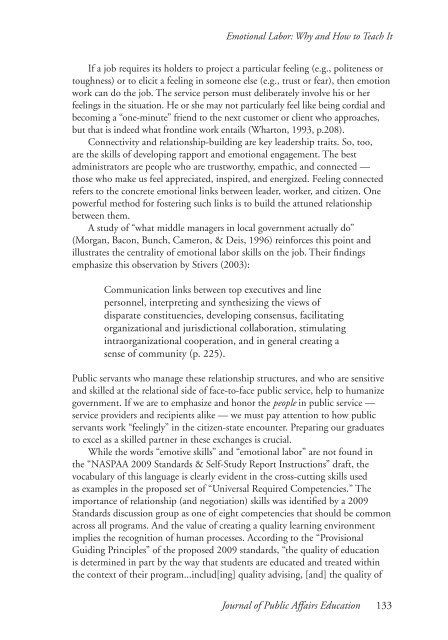JOURNAL OF PUBLIC AFFAIRS EDUCATION - Naspaa
JOURNAL OF PUBLIC AFFAIRS EDUCATION - Naspaa
JOURNAL OF PUBLIC AFFAIRS EDUCATION - Naspaa
You also want an ePaper? Increase the reach of your titles
YUMPU automatically turns print PDFs into web optimized ePapers that Google loves.
Emotional Labor: Why and How to Teach ItIf a job requires its holders to project a particular feeling (e.g., politeness ortoughness) or to elicit a feeling in someone else (e.g., trust or fear), then emotionwork can do the job. The service person must deliberately involve his or herfeelings in the situation. He or she may not particularly feel like being cordial andbecoming a “one-minute” friend to the next customer or client who approaches,but that is indeed what frontline work entails (Wharton, 1993, p.208).Connectivity and relationship-building are key leadership traits. So, too,are the skills of developing rapport and emotional engagement. The bestadministrators are people who are trustworthy, empathic, and connected —those who make us feel appreciated, inspired, and energized. Feeling connectedrefers to the concrete emotional links between leader, worker, and citizen. Onepowerful method for fostering such links is to build the attuned relationshipbetween them.A study of “what middle managers in local government actually do”(Morgan, Bacon, Bunch, Cameron, & Deis, 1996) reinforces this point andillustrates the centrality of emotional labor skills on the job. Their findingsemphasize this observation by Stivers (2003):Communication links between top executives and linepersonnel, interpreting and synthesizing the views ofdisparate constituencies, developing consensus, facilitatingorganizational and jurisdictional collaboration, stimulatingintraorganizational cooperation, and in general creating asense of community (p. 225).Public servants who manage these relationship structures, and who are sensitiveand skilled at the relational side of face-to-face public service, help to humanizegovernment. If we are to emphasize and honor the people in public service —service providers and recipients alike — we must pay attention to how publicservants work “feelingly” in the citizen-state encounter. Preparing our graduatesto excel as a skilled partner in these exchanges is crucial.While the words “emotive skills” and “emotional labor” are not found inthe “NASPAA 2009 Standards & Self-Study Report Instructions” draft, thevocabulary of this language is clearly evident in the cross-cutting skills usedas examples in the proposed set of “Universal Required Competencies.” Theimportance of relationship (and negotiation) skills was identified by a 2009Standards discussion group as one of eight competencies that should be commonacross all programs. And the value of creating a quality learning environmentimplies the recognition of human processes. According to the “ProvisionalGuiding Principles” of the proposed 2009 standards, “the quality of educationis determined in part by the way that students are educated and treated withinthe context of their program...includ[ing] quality advising, [and] the quality ofJournal of Public Affairs Education 133
















